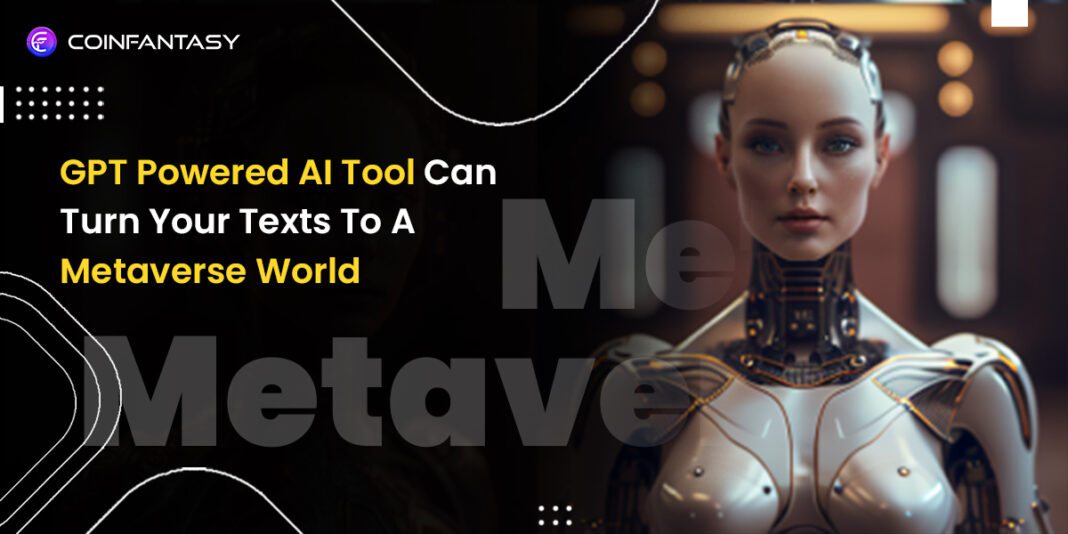Several industries and interactions are being transformed by GPT-powered AI tools, and one Web3 metaverse platform has already figured out how to use the technology.
Oncyber, a platform for creating 3D worlds that supports a variety of NFTs and is used by communities and Web3 artists, learned this week. It has created Magic Composer, an AI-powered application that enables environment customization by text inputs.
It’s similar to utilizing ChatGPT, instead of delivering a functional blockchain, codeOnCyber uses text prompts to make changes to its environment in real time. It operates on OpenAI’s GPT-3.5 model, not the more recent GPT-4.
By training the model on a sizable dataset of text descriptions and letting it generate fresh content based on that training, GPT enables developers to build virtual worlds and environments. This enables the construction of distinctive, immersive virtual experiences that can be customized for every user.
Developers may now produce more tailored and interesting Metaverse experiences than ever before by utilizing GPT-powered AI tools and other AI technologies. There are a plethora of potential uses for this technology, and it may have a big influence on how we interact with digital surroundings in the future.
GPT-powered AI tools have recently been used to build unique Metaverse environments. The phrase “metaverse” refers to a shared virtual environment made possible by the fusion of several technologies, like VR & AR, and artificial intelligence. Users can communicate with one another and the surroundings in real time in this digital cosmos.
The introduction of GPT-powered AI tools was not intended to capitalize on the newest, most exciting technological trend, but rather to create new ways to encourage user innovation on the platform. According to Boutaleb, there is a performance gap between the visual interface and the game-like engine used by Oncyber.
Users have access to The Magic Composer, which makes it quite simple to achieve what they desire. Hopefully, the AI tool will lessen some of the complexity and provide accessible ways to customize online 3D locations as Oncyber continues to offer developers ways to create better worlds and adds more world-building tools in the upcoming months.
Oncyber: Quick Overview
Oncyber, a metaverse platform that was introduced in 2021, is comparable to Web3 metaverse gaming platforms. It lets players create their online places.
Yet unlike other platforms, Oncyber dismissed the concept of “FOMO” and speculation caused by a lack of available land by refusing to sell the NFT lots needed to construct in these worlds. However, Oncyber sells NFT-based templates and collaborates with architects and designers to produce pre-designed rooms that may be further modified.
You can build a place without using an NFT or cryptocurrency wallet because there are also free templates and spaces available. Users of Oncyber can also add their NFTs to the network, like ether, Solana, polygon, and others. Although other NFT collectors utilize the platform to stage immersive online community events, some use Oncyber to build their virtual art galleries.
GPT Powered AI Tool’s Scope in the Metaverse
Modern AI-driven language GPT, which is capable of accelerating human-like prose, can use this technology in a variety of ways. GPT-powered AI tools have the potential and capacity to benefit in a variety of ways from the metaverse, such as:
- GPT-powered AI tool’s possible benefits in the metaverse include the capacity to establish automation or virtual assistants. These AI-powered entities could help users or customers get around the metaverse and complete the tasks at hand, including looking for specific locations or connecting with other linked users.
- GPT-powered AI tools might be used to produce text and material in a variety of languages, making it easier for users to access and enjoy the metaverse.
- A more lifelike and developing metaverse technology can be made by employing GPT’s characteristics, which provide you the ability to create plausible and realistic virtual characters or avatars.
- GPT has the capacity to provide material that is specifically suited to the user’s preferences, priorities, and ways of thinking. This might be utilized to provide individualized metaverse knowledge, which might be particularly enticing to customers looking for the best possible experience.
The potential for biassed response based on the data used to train the model is one of the GPT tools’ drawbacks, which should be kept in mind. Beyond natural language processing, a wide range of technology and design factors, including virtual reality and user interface design, are taken into account in the creation of the Metaverse economy.
Final Note
In a matter of fact, while GPT-powered AI tools have the potential to aid in the growth of the Metaverse sector, they are merely a small component of a much larger picture, and the extent to which they will have an impact will depend on a number of variables, including the ecosystem’s overall development as well as the tools’ continued development and improvement.

